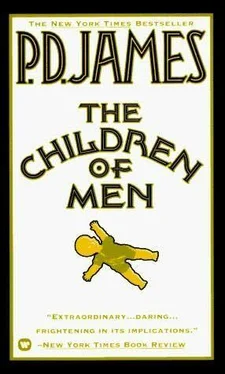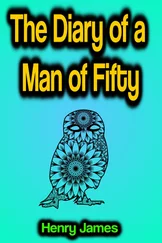Miriam said: “We can cover him first with leaves, and then with the earth.”
Still Rolf made no move to help, but the other three went back into the wood and came with armfuls of dried and mouldering leaves, the brown lightened by the bright bronze of the newly fallen beech leaves. Before they began the burial Julian rolled up Luke’s stole and dropped it into the grave. For a second Theo was tempted to protest. They had so little: their clothes, a small torch, the gun with the bullet. The stole could have been useful. But for what? Why grudge Luke what was his? The three of them covered the body with leaves, then began with their hands shifting the soil from the edge of the field on top of the grave. It would have been quicker and easier for Theo to kick the sliced clots of earth over the body and stamp them down but in Julian’s presence he felt unable to act with such brutal efficiency.
Throughout the burial Julian had been silent but perfectly calm. Suddenly she said: “He should lie in consecrated ground.” For the first time she sounded distressed, uncertain, plaintive as a worried child.
Theo felt a spurt of irritation. What, he nearly asked, did she expect them to do? Wait until dark then dig up the body, lug it to the nearest cemetery and reopen one of the graves?
It was Miriam who replied. Looking at Julian, she said gently: “Every place where a good man lies is consecrated ground.”
Julian turned to Theo. “Luke would want us to say the Burial Service. His prayer book is in his pocket. Please do it for him.”
She shook out the bloodstained coat and took from an inside breast pocket the small black leather prayer book, then handed it to Theo. It took only a little time to find the place. He knew that the service wasn’t long, but even so decided to truncate it. He couldn’t refuse her, but it wasn’t a task he welcomed. He began speaking the words, Julian standing on his left and Miriam on his right. Rolf stood at the foot of the grave, straddling it with his legs, his arms folded, gazing ahead. His ravaged face was so white, the body so rigid, that, looking up, Theo almost feared that he would crash forward over the soft earth. But he felt an increased respect for him. It was impossible to imagine the enormity of his disappointment or the bitterness of his betrayal. But at least he was still on his feet. He wondered if he would have been capable of such control. He kept his eyes on the prayer book but he was aware of Rolf’s dark eyes staring at him across the grave.
At first his voice sounded strange to his own ears, but by the time he got to the psalm the words had taken over and he spoke quietly, with confidence, seeming to know them by heart. “Lord, thou hast been our refuge: from one generation to another. Before the mountains were brought forth, or ever the earth and the world were made: thou art God from everlasting, and world without end. Thou turnest man to destruction: again thou sayest, Come again, ye children of men. For a thousand years in thy sight are but as yesterday: seeing that is past as a watch in the night.”
He came to the words of the committal. As he spoke the sentence “Earth to earth, ashes to ashes, dust to dust; in sure and certain hope of the Resurrection to eternal life, through our Lord Jesus Christ,” Julian squatted down and threw a handful of earth over the grave. After a second’s hesitation Miriam did the same. With her graceless swollen body, it was difficult for Julian to squat, and Miriam put out a supporting hand. There came into Theo’s mind, unsought and unwelcome, the image of a defecating animal. Despising himself, he thrust it aside. When he spoke the words of the grace, Julian’s voice joined his. Then he closed the prayer book. Still Rolf neither moved nor spoke.
Suddenly, in one violent movement, he turned on his heel and said: “Tonight we’ll have to get hold of another car. Now I’m going to sleep. You’d better do the same.”
But first they made their way along the hedge, stuffing their mouths with the blackberries, hands and lips purple-stained. The bushes, unplundered, were heavy with the ripe berries, small plump grenades of sweetness. Theo marvelled that Rolf could resist them. Or had he already that morning eaten his fill? The berries, breaking against his tongue, restored hope and strength in beads of unbelievably delicious juice.
Then, with hunger and thirst partly assuaged, they returned to the copse, to the same fallen trunk which seemed to offer at least the psychological reassurance of a hiding place. The two women lay down closely together, Luke’s stiffening coat wrapped round them. Theo stretched himself at their feet. Rolf had already found his bed on the other side of the trunk. The earth was soft with the mulch of decades of fallen leaves but even had it been hard as iron Theo would still have slept.
It was early evening when he awoke. Julian was standing over him. She said: “Rolf’s gone.”
He was instantly wide awake. “Are you sure?”
“Yes, I’m sure.”
He believed her, yet even then he had to speak the spurious words of hope: “He could have gone for a walk, needed to be alone, wanted to think.”
“He has thought; now he’s gone.”
Still obstinately trying to convince her, if not himself, he said: “He’s angry and confused. He no longer wants to be with you when the child is born, but I can’t believe he’ll betray you.”
“Why not? I betrayed him. We’d better wake Miriam.”
But there was no need. Their voices had reached Miriam’s wakening consciousness. She sat up abruptly and looked across to where Rolf had lain. Struggling to her feet, she said: “So he’s gone. We ought to haveknown he would. Anyway we couldn’t have prevented him.”
Theo said: “I might have kept him with us. I’ve got the gun.”
It was Miriam who answered the question in Julian’s eyes. “We’ve got a gun. Don’t worry, it could be a useful thing to have.” She turned from Julian to Theo. “Kept him with us maybe, but for how long? And how? One of us holding the gun to his head night and day, taking it in turns to sleep, to guard him?”
“You think he’s gone to the Council?”
“Not to the Council, to the Warden. He’s changed his allegiance. He’s always been fascinated by power. Now he’s joined forces with the source of power. But I don’t think he’ll telephone London. This news is too important to be leaked. He’ll want to give it in person to the Warden alone. That gives us a few hours, maybe more-say five if we’re lucky. It depends when he left, how far he’s got.”
Theo thought: Five hours or fifty, what difference does it make? A weight of despair dragged at mind and limbs, leaving him physically weakened so that the instinct to sink to the earth almost overpowered him. There was a second—hardly more—in which even thought was numbed; but it passed. Intelligence reasserted itself and with thought came a renewal of hope. What would he do if he were Rolf? Make his way to the road, hail the first car, find the nearest telephone? But was it that simple? Rolf was a hunted man without money, transport or food. Miriam was right. The secret he carried was of such importance that it must be kept inviolate until it could be told to the one man to whom it would mean most and who would pay most for it: Xan.
Rolf had to reach Xan, and to reach him safely. He couldn’t risk capture, the casual bullet from some trigger-happy member of the State Security Police. Even arrest by the Grenadiers would be hardly less disastrous; the prison cell in which he would be at their mercy, his demands to see the Warden of England immediately meeting with laughter and contempt. No, he would try to make his way to London, travelling, as they were, under cover of night, living off the land. Once in the capital, he would show himself at the old Foreign Office, demand to see the Warden, secure in the knowledge that he had reached the place where that demand would be taken seriously, where power was absolute and would be exercised. And, if persuasion failed and access was denied, he would have that final card to play. “I have to see him. Tell him from me that the woman is pregnant.” Xan would see him then.
Читать дальше












